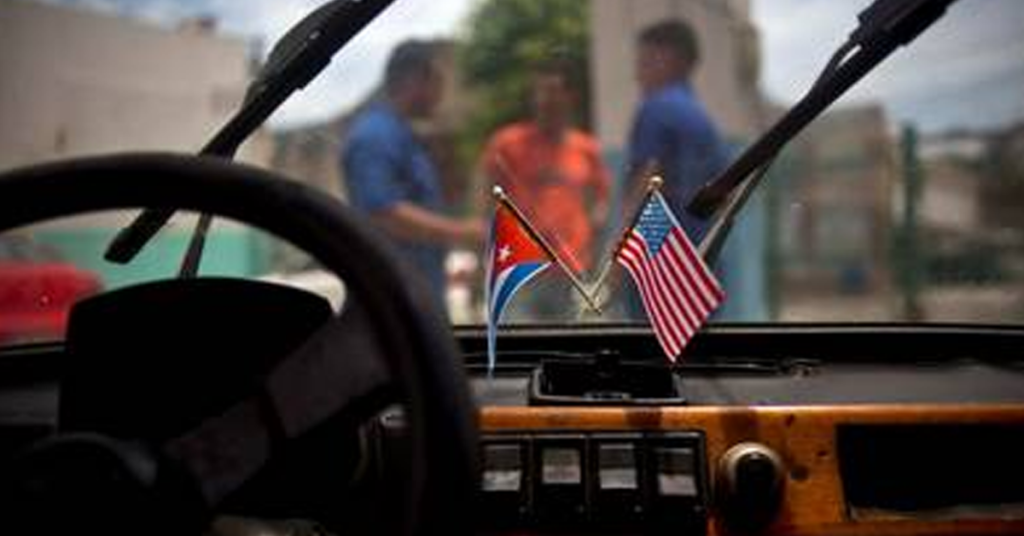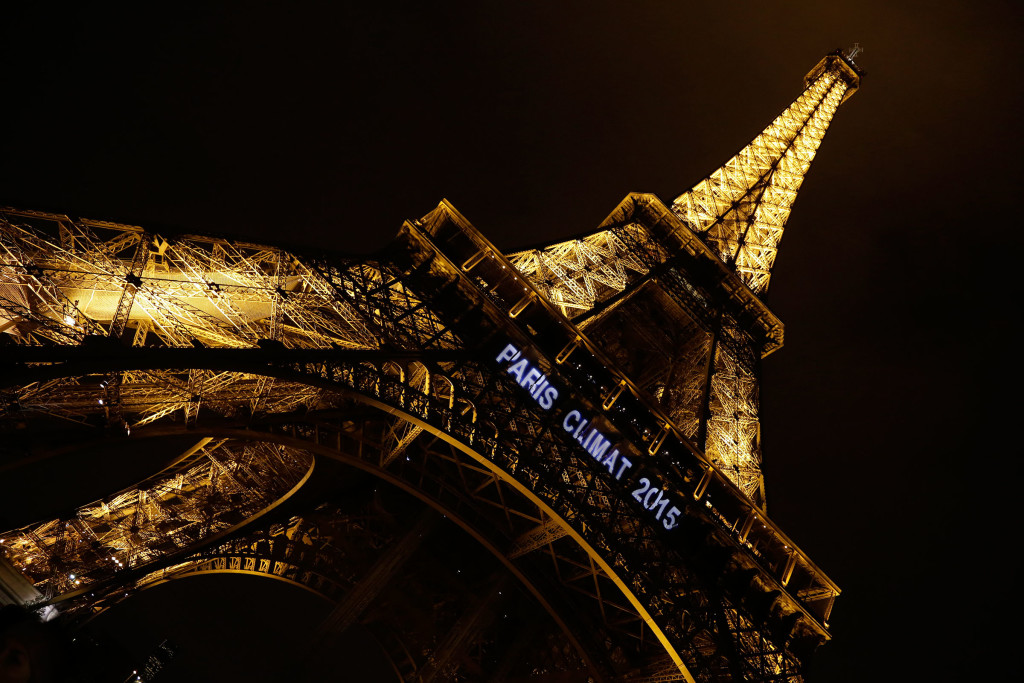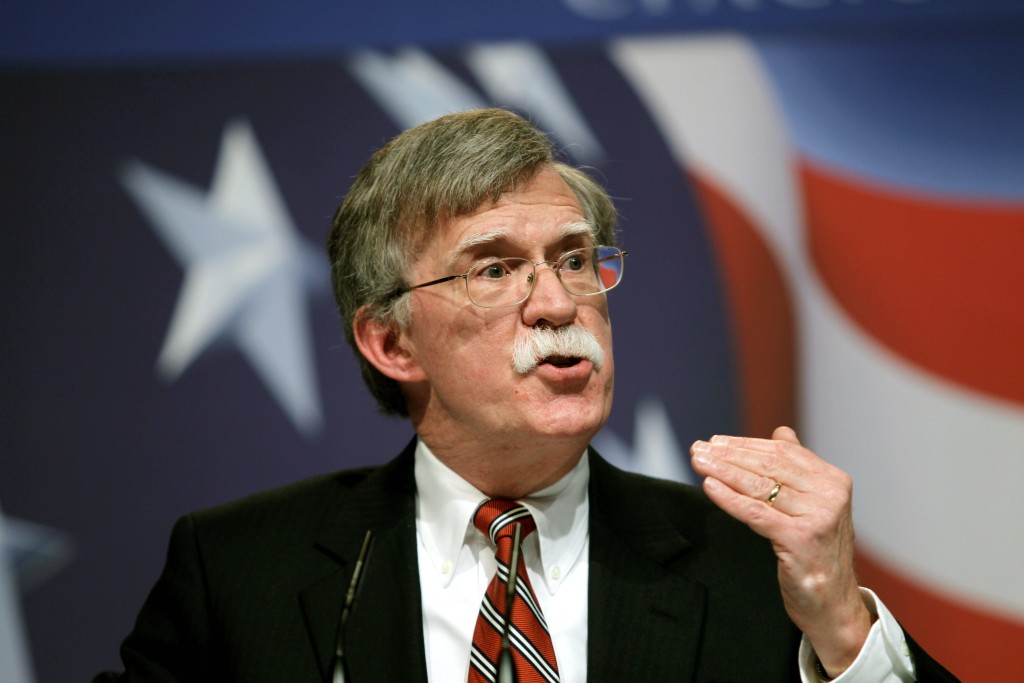Egypt: Donald Trump should have chance to resolve Mideast conflict

Egypt says its president received a call from President-elect Donald Trump in which they both agreed to give the incoming U.S. administration a chance to try and resolve the Israeli-Palestinian conflict. The call came hours after Egypt indefinitely postponed a U.N. vote on a Security Council resolution criticizing Israeli settlements following pressure from Israel and Trump, who had called on members to veto it. A statement from the Egyptian presidency says the two men spoke by phone early Friday and agreed on “the importance of giving a chance for the new American administration to deal in a comprehensive way with the different aspects of the Palestinian issue with the aim of achieving a comprehensive and a final resolution.” Republished with permission of the Associated Press.
United States says it will abstain on UN vote on Cuba embargo

The United States announced Tuesday that it will abstain for the first time in 25 years on a U.N. resolution condemning America’s economic embargo against Cuba, a resolution it had always vehemently opposed. The announcement by U.S. Ambassador Samantha Power ahead of a vote on the resolution was greeted with applause in the 193-member General Assembly. Power said the U.S. was abstaining because of President Barack Obama‘s new approach to Cuba, but she made clear that the United States “categorically” rejects statements in the resolution suggesting the embargo violated international law. She also stressed that abstaining “does not mean that the United States agrees with all of the policies and practices of the Cuban government.” “We do not,” Power said. “We are profoundly concerned by the serious human rights violations that the Cuban government continues to commit.” Republished with permission of the Associated Press.
UN experts rip gender discrimination in U.S. following Alabama visit

A three-member United Nations working group on the status of women worldwide had harsh words for United States officials in a report they produced last week after visits to Alabama, Texas, and Oregon. In an extended official statement, U.N. women’s rights experts Eleonora Zielinska, Frances Raday, and Alda Facio chastised American policymakers over a host of lingering disparities in the political and economic status of men and women. The report was commissioned by the U.N. High Commissioner for Human Rights. The group criticized the U.S. government for failing to ratify the international Convention on the Elimination of All of Forms of Discrimination Against Women agreement, which all but seven U.N. members have enacted, as well as hostility towards women in popular culture, widespread challenges to reproductive rights, and persistent shortcomings in representation of women in politics and business. “We acknowledge the United States’ commitment to liberty, so well represented by the Statue of Liberty which symbolizes both womanhood and freedom,” began the report. “Nevertheless, in global context, US women do not take their rightful place as citizens of the world’s leading economy, which has one of the highest rates of per capita income. “In the US, women fall behind international standards as regards their public and political representation, their economic and social rights and their health and safety protections,” the report went on. Citing the ongoing election season the panel said their recent trip stateside, including to Alabama on December 4-5, was especially instructive. “[O]ur visit is particularly timely at a moment when the political rhetoric of some of the candidates for the Presidency in the upcoming elections has included unprecedented hostile stereotyping of women; when there are increasingly restrictive legislative measures in some states and violent attacks to prevent women’s access to exercise of their reproductive rights; and when there is an increase in the rate of women living in poverty, a persistent wage gap and increasingly precarious employment,” the panel inveighed. Alabama State Auditor Jim Zeigler reacted to the report Monday by saying no such panel has any authority over Alabamabians’ way of life and or any business in the state in the first place. Zeigler also criticized the panels’ methodology, specifically their choices when it came to interview subjects who testified to the experts. The Republican attorney and public ombudsman noted the report dinged states for teaching abstinence in sex education, restrictions on access to abortions, and prosecution of prostitutes. “The investigators heard from Dr. Willie Parker, who performs abortions in Montgomery. In the meetings was ACLU Alabama attorney Lucia Hormo,” Zeigler said. “Notice they did not meet with any church leaders, adoption advocates, and abortion alternative counselors.” Zeigler went on to say the visit and the resulting study are part of a plan to supersede America’s national sovereignty and increase international, U.N.-led control over social policy in the community of nations. Sounding a note familiar to many proponents of theories in the conservative media centered on Agenda 21, Zeigler called the report “the next step of an agenda to impose U.N. standards in every state that does not resist this intrusion.” “The U.N. is preparing to try to dictate to Alabama what we must do on abortion, contraceptives given to youth, sex education in schools, tolerance of alternative sexual orientation and other ‘progressive’ issues,” Zeigler said. “I will monitor this developing situation and report back. I will also coordinate a strategy for how we can resist this U.N. intrusion.” “We should not just sit back and say they have no jurisdiction and cannot do this. They don’t care and will proceed anyway if not smartly opposed. I have no confidence in our President and Governor to block this. We citizens need to proactively oppose this dangerous U.N. intrusion,” said Zeigler. “To use an Alabama expression, ‘They do not have any bidness here’,” Zeigler concluded. The women’s rights panel is slated to file their final report on the status of women in the U.S. in June 2016.
Paris climate talks: 5 things you need to know to catch up

The multi-national, two-week United Nations climate summit in Paris — 21st Conference of Parties (COP21) — is halfway over. There, more than 30,000 diplomats and delegates have been hard at work in efforts to stave off the consequences of global climate change. The summit, scheduled to wrap-up Friday, Dec. 11, marks the largest gathering of world leaders in history. “Never have the stakes of an international meeting been so high, since what is at stake is the future of the planet, the future of life,” President François Hollande of France told a packed United Nations plenary session last week. Haven’t been following the summit? Here are the top five things you need to know to catch-up on what’s been happening the past 10 days: U.S. pledges to double aid to climate-hit countries. Secretary of State John Kerry pledged the United States will double its spending on climate change grants for developing nations and will spend up to $860 million in grant-based funding for developing countries by 2020. Negotiators have released a new, shorter draft of the international climate accord. Down to 29-pages, from the previous 43-page version, the new draft still has roughly 100 spots where decisions must still be made. Protesters hold sit-in against the new draft agreement. According to the Associated Press, “Hundreds of protesters have held a sit-in demonstration against a new draft agreement released Wednesday at the Paris climate talks.” China accused of blocking progress at talks. Chinese negotiators have been accused of trying to weaken the new global climate agreement. The big issue? The proposed accord requires each nation to update the United Nations (UN) on the pledges they have made to limit their carbon dioxide (CO2) emissions. Obama blames the United States. President Barack Obama attended the climate talks last week, where he said the United States was at least partly to blame for the life-threatening damage bought on by global climate change.
Former UN Ambassador John Bolton won’t run for President

John Bolton, the former U.S. ambassador to the U.N. and one of the Republican Party’s most prominent national security hawks, has confirmed that he will not run for president. In a media conference call and separate video to supporters, Bolton said he would work through his political action committees and PACs to influence the 2016 elections by pushing candidates to promote aggressive foreign and military policies. “I believe I can make the strongest contribution to our future by continuing as a clear and consistent advocate for a strong, Reaganite foreign policy that values peace through strength,” Bolton said in the video. But, he told reporters, his own campaign “was not feasible,” saying that an established “political class in this country” makes it harder for lesser-known candidates to compete seriously for the presidency. “I’m not complaining,” he said, adding, “I’m a realist.” A leading foreign policy voice in the George W. Bush White House, Bolton spent recent months testing his muscular foreign policy message in early voting states. He often lashed out at Democratic presidential candidate Hillary Rodham Clinton, as well as Republican rivals – Kentucky Sen. Rand Paul in particular – who favor a reduced U.S. military presence in the world. He blasted Clinton again Thursday, calling her tenure as President Barack Obama‘s first secretary of state a “failure.” “Republicans need to make sure they don’t allow her to skip away with using national security as an issue that works in her favor,” he said. Bolton said he has no immediate plans to endorse any Republican. Bolton’s decision not to run is somewhat surprising in an election season in which more than a dozen ambitious Republicans may pursue a run for the nomination. Declared candidates include Paul, Florida Sen. Marco Rubio, Texas Sen. Ted Cruz, former technology executive Carly Fiorina and retired neurosurgeon Dr. Ben Carson. A slew of current and former governors, including Florida Gov. Jeb Bush, Wisconsin Gov. Scott Walker and New Jersey Gov. Chris Christie, are expected to announce their plans in the coming weeks. Despite saying a campaign wasn’t “feasible,” Bolton insisted that “funding would have been there in an adequate amount.” He noted that his political organizations spent about $7.5 million on House and Senate races in the 2014 midterm elections. Republished with permission from The Associated Press.


